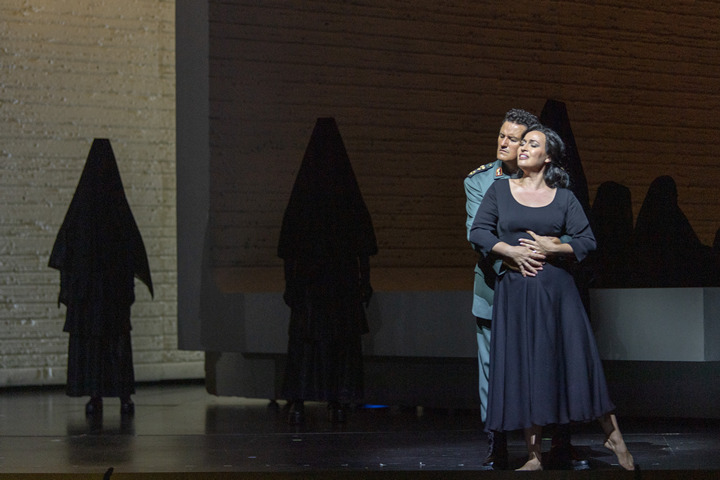| Opera Reviews | 19 April 2024 |
Shirin Neshat's Aida returns to a mixed receptionby Moore Parker |
|
Verdi: Aida |
|

|
|
|
As the final opera of this season’s Salzburg Festival, Verdi’s Aida saw an updated revival of the 2017 production by Shirin Neshat. Evidently something of an experiment as a first attempt at opera - and one which reminds obstrusely of Hermann Nitsch’s venture at the Wiener Staatsoper in 1995 with Massenet’s Hérodiade - salvaged only by a stellar cast featuring Plácido Domingo and Agnes Baltsa. In interviewing Nitsch back then, he proudly declared that he viewed the event “not as a Massenet opera, but as a Nitsch Happening”! Here, designer Christian Schmidt selected a rotating, dividable cube in plain white as his basic set with apertures and recesses to house the large ensemble scenes. While well providing projection surfaces (vital to the concept) the grandest moments of the work appeared claustrophobic, and rather paltry for the venue. Ms. Neshat’s updated version includes two of her early video films (entitled Rapture and Passage) with images ranging from women fleeing in a desert and eventually heading out to sea in a small boat, to a mourning procession in which men carry a corpse across various terrains, and a circle of women digging a grave with their bare hands, as examples - plus a great number of large portraits which are interminably projected to recorded background whispers during scene changes on stage. At one point the feet of a male corpse appear, with an identification label hanging from one of the toes. While on the drawing board a marriage to the issues raised in Verdi’s Aida here seem plausible, the question remains; how? As always, the proof is in the pudding. After the first series of stills, a few nearby audience members lost interest and began using the opportunities to check their mobile phones. But, most disturbing was the film footage which was screened during significant arias ("Celeste Aida" and "O Patria mia" included) - distracting from the singer and the personal message to hand, as well as creating a lamentable audio-visual conflict in rhythm. And so this event relied inevitably on its musical attributes - and fortunately they were generally commendable. To begin, the “debutant”, as it were - Piotr Beczala in his first stage Radamès. In his initial appearance at Salzburg (Rusalka in 2008), I drew a comparison to the legendary Nikolai Gedda which in many respects has held true. Beczala is now fortunately blessed with more vocal weight than his Swedish predecessor, and - together with his solid technique - he scored a deserved success on this evening, if yet not a true “natural” for the role. Beczala wisely guards his pacing and register balance throughout (for example, cleverly negotiating the first two phrases of "Celeste Aida" which rise to an F natural - followed by the “Mistico serto” - marked dolce - which ascends to a challenging F sharp in the passaggio). Incidentally, on this evening, he ended the aria on a pure falsetto B flat, rather than mixed voice. The most exposed segment for this Radamès was the Triumphal Scene in which he seemed to harbour his resources for more exposed opportunities to follow after the interval. He really rose to the occasion in the great duet with Amneris (the highlight of the performance) with ample reserves for his dramatic outbursts, yet while retaining fresh plasticity and lyricism for the testing farewell scene with Aida. In the title role, Elena Stikhina produced some ravishing sounds on occasions. The voice blossoms and projects well in its upper mid-range, occasionally turning a touch metallic and precarious (as in the Nile scene) at the extreme top, but so lacking in its lower register that essential words and tones often disappeared into a mannered sotto voce of understatement. This, together with a very cool stage manner and a certain lack of grand Verdian sweep left rather a sense of being somewhat short-changed. It might be fair to say that Ève-Maud Hubeaux’s Amneris enjoyed the evening’s real triumph. And indeed, with her appealing looks, strikingly-sleek figure and passionate vocal contribution, one has to question this Radamès taste somewhat. I recall her doing well here in OEdipe several years ago, and later as Eboli in Vienna - but this was a true tour-de-force which will undoubtedly bear fruit for a shining future. The odd disappointment was Luca Salsi’s Amonasro - seemingly detached (possibly as a result of being carried to the Nile scene on a stretcher) - and apparently left largely to his own devices. The subsequent interaction between baritone and soprano remained rather “ham” and fell out of sync at times with the pit. Erwin Schrott nicely filled Ramfis’ upper range with his burnished bass-baritone, while seeming a touch informal and unauthoritative in manner for the figure. And returning from the original cast, Roberto Tagliavini presented a fine-timbred if rather lightweight King. Two young promising voices deserve mention - in Riccardo Della Sciucca (Un messaggero), and Flore Van Meerssche (Una sacerdotessa). The Konzertvereinigung Wiener Staatsoper delivered some exquisite moments throughout, with Alain Altinoglu drawing particularly fine rhythmic details (especially in the string section) from the Wiener Philharmoniker and well transporting an evening which had an odd air of being somewhat unconcerted.
|
|







